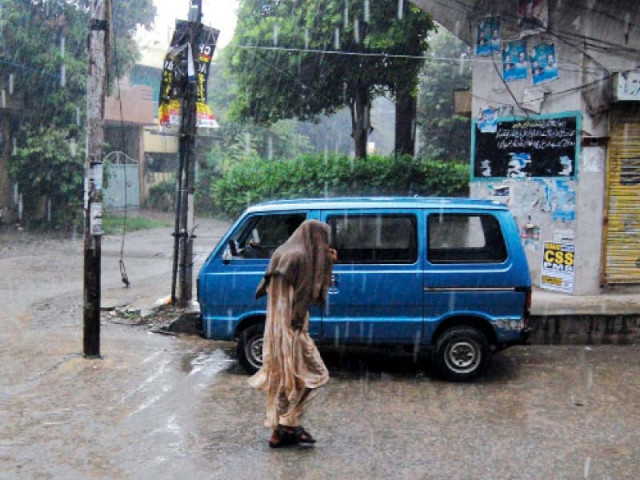At the mercy of the floods
Many of the deaths reported from across the country have occurred as a result of roofs or walls caving in.

A man covers his head while walking amid heavy rain in Islamabad. PHOTO: MUHAMMAD JAVAID/EXPRESS

The hilly terrain of some parts of Balochistan, including Jhal Magsi, Jafarabad and Naseerabad districts, makes them particularly vulnerable to floods, with water gushing into settlements as it pours off the surrounding higher grounds. All three districts have suffered before, with mass displacement seen as a result. This is already taking place again, as villages are inundated, causing houses to collapse. Seven districts of Balochistan are reported to be affected, with more rains also forecast for the days ahead. As always, it is the poor who live in inadequate housing, who are worst affected. Many of the deaths reported from across the country have occurred as a result of roofs or walls caving in.
A crucial question arises here. Are we really entirely helpless against the flooding? Can we do nothing to prevent the amount of damage they cause or, at least, prevent such massive loss of life? Following the devastating floods of 2010 — widely believed to be the worst in the country’s history — local disaster management agencies and international humanitarian groups wrote up long reports on what could be done to prevent such havoc. More such reports came in after the 2011 floods, which most adversely affected Sindh. A series of early warning systems, means to increase resilience and measures to channel water flows away from settlements were recommended. In a study conducted after the floods, the aid agency Oxfam noted Pakistan was not doing enough to improve its disaster preparedness. Its report issued clear-cut warnings about the potential consequences of this.
Sadly, these and other warnings were ignored. We need some answers from authorities as to why this happened; why there was so much indifference to the plight of people and why this neglect continues. Indeed, the ravages they have suffered over past years means people are even less able to sustain the damage the new round of rains have brought, with many, notably in Sindh, still to be re-housed after flooding in previous years. Many in Badin and other districts, also affected in 2012, continue to live in rudimentary, makeshift shelters. A large number have lost their means of livelihood as a result of the destruction of lands and crops.
So, where are the authorities — the civic agencies; the disaster management bodies? In Karachi, as life came to a standstill after the rain, there was certainly no sign of a set-up in place to manage the city. The suspension of officials in Gadap Town and other areas after the event certainly does nothing to help people who have suffered badly as a result of flooding. We must also ask what role the National Disaster Management Authority, and the provincial set-ups linked to it, has been playing. The primary purpose of the body, set up after the 2005 earthquake, was to help plan for disaster, prevent loss of life where possible and tackle post-disaster situations. None of this has happened, the latest rains have inflicted huge suffering and we fear this may increase with the monsoon season, as yet, far from over, unless emergency steps are taken.
Published in The Express Tribune, August 6th, 2013.
Like Opinion & Editorial on Facebook, follow @ETOpEd on Twitter to receive all updates on all our daily pieces.















COMMENTS
Comments are moderated and generally will be posted if they are on-topic and not abusive.
For more information, please see our Comments FAQ